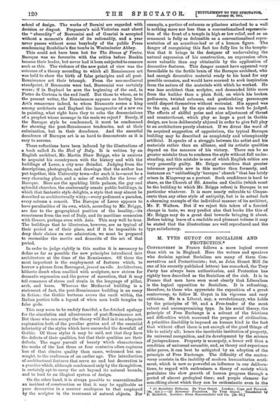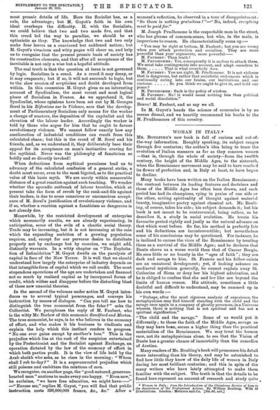M. 'YVES G1TYOT ON SOCIALISM AND
PROTECTION.* CONTROVERSY in France follows a more logical course than with us in England. Here the writers and speakers who declaim against Socialism are many of them Con- servatives and Protectionists ; but, as John Stuart Mill (in one of his recently published letters) has remarked, the Tory Party has always been authoritarian, and Protection has rightly been described as the Socialism of the rich. It is in France that men have seen most clearly that Liberalism is the logical opposition to Socialism. It is refreshing, therefore, to those who appreciate the exposition of a great controversy, to follow M. Guyot in his vigorous and racy criticism. He in a Liberal, nay, a revolutionary, who holds by the principles of '89, and a Free-trader of the most robust and uncompromising type. In his social theory, the principle of Free Exchange is a solvent of the frictions and difficulties which surround the progress of civilisation. A primitive disability is imposed on human kind in the fact that without effort there is not enough of the good things of life to satisfy all; hence the inevitable institution of property, its universal recognition, and its development by the science of jurisprudence. Property is monopoly, a lesser evil than a, condition of universal scramble, and, as theory and experience alike prove, it can best be mitigated by an adoption of the principle of Free Exchange. The difficulty of the contro- versy consists in the inability of modern humanitarian senti- ment, which is now so powerful an influence in our delibera- tions, to regard with enthusiasm a theory of society which postulates the slow growth of human progress through a period of almost geological time ; and people clamour for somathing about which they can be enthusiastic even in the
• (1) Socialistic Fallacies. By Yves Gvot. London: Cope and Fonwiek. Rio. net.)—(2) Economia Prejudices. By. Yves Guyot. Translated by P. Bothwell. London: Swan Sonnensehein and Co. Ps. 6d.]
most prosaic details of life. Here the Socialist has, as a rule, the advantage ; but M. Gnyot's faith in his own ideal overleaps the difficulty. If, with the Socialists, we could believe that two and two made five, and that this creed led the way to paradise, we should be as optimistic as they. The knowledge that two and two only make four leaves us a convinced but saddened nation ; but M. Gnyot's vivacious and witty pages will cheer us, and help us to recognise that the present prosaic basis of society has its constructive elements, and that after all acceptance of the inevitable is not only a wise but a hopeful attitude.
The real truth is that the question at issue is not governed by logic. Socialism is a creed. As a creed it may decay, or it may evaporate ; but if so, it will not succumb to logic, but to the slow erosion of scepticism and doubt developed from within. In this connexion M. Guyot gives us an interesting account of Syndicalism, the most recent and most logical phase of Socialism in France. As we apprehend it, the Syndicalist, whose opinions have been set out by 31. Georges Sorel in his Rejlezions ear la Violence, sees that the develop- ment of Parliamentary Socialism only means for the worker a change of masters, the deposition of the capitalist and the elevation of the labour leader. Accordingly the worker is told by those who argue for him that he ought to favour revolutionary violence. We cannot follow exactly how any amelioration of industrial conditions can result from this calculated chaos ; but this is the creed of M. Sorel and his friends, and, as we understand it, they deliberately base their appeal for its acceptance on man's instinctive craving for the mythical. Never was the philosophy of fanaticism so boldly and so directly invoked!
When deductions from mythical premisses lead us to advocacy of the calculated confusion of a general strike, a doubt must occur, even to the most bigoted, as to the practical value of this basic myth. We are surely within measurable distance of a great reaction against such teaching. We wonder whether the sporadic outbreak of labour troubles, which at present take the form of revolt by the rank-and-file against their leaders, is due to some conscious or unconscious accept- ance of M. Sorel's justification of revolutionary violence, and if so, whether a reaction against a fanaticism so dangerous is not already duo.
Meanwhile, by the restricted development of enterprise which necessarily results, we are already experiencing, in anticipation, some of the evils of a chaotic social theory. Trade may be increasing, but it is not increasing at the rate which the expanding ambition of a growing population requires, and, except for our perverse desire to distribute property not by exchange but by coercion, we might add, distinctly warrants. In a witty chapter on "The Exploita- tion of Intimidation" M. Guyot dwells on the paralysis of capital in face of the New Terror. It is well that we should understand how largely the enterprise of industry depends on that intangible form of capital which we call credit. The most stupendous operations of the age are undertaken and financed not so much by realised capital as by incorporeal forms of credit, which wither and disappear before the disturbing blast of these new unsocial theories.
In the second of the volumes under notice M. Guyot intro- duces us to several typical personages, and conveys his instruction by means of dialogue. "Can you tell me how to distinguish the true economist from the false ? " asks the Colbertist. We paraphrase the reply of M. Faubert, who is the witty Mr. Barlow of this economic Sandford and Merton. The true economist, he says, is he who believes in the economy of effort, and who makes it his business to vindicate and explain the help which this instinct renders to progress. "No one ever gains except by another's loss." This is the prejudice which lies at the root of the suspicion entertained by the Protectionist and the Socialist against Exchange, an operation dictated by the law of the economy of effort in which both parties profit. It is the view of life held by the Arab sheikh who asks, as he rises in the morning : "Whom shall I rob to-day ? " It is a superannuated prejudice which still poisons and embitters the relations of men.
We recognise, on another page, the "good-natured, generous- hearted man" anxious to make every one happy. "Even now,"
he exclaims, "we have free education, we might have " —" Excuse me," replies 31. Guyot, "you will find that public instruction costs 336,000,000 francs, eke., Sm." After a
moment's reflection, he observed in a tone of disappointment : "So there is nothing gratuitous ? "—" No, indeed, everything must be paid for."
M. Joseph Prudhomme is the respectable man in the street, who has gleams of common-sense, but who, in the main, is impervious to reason. He characteristically sums up :—
"You may be right at bottom, M. Faubert; but you are wrong when you attack protection and socialism. They are more powerful than your arguments, more powerful- FA.17BEBT : Than truth?
Pauorroxsta : Yes, consequently it is useless to attack them. We must take contingencies into account, and adapt ourselves to them That is what everybody does.
M. FAUBERT : You are right, M. Prudhomme. It is not violence that is dangerous, but rather that socialistic endosmosis which is continually eating into our brains, our institutions and our
customs So you think we ought to give in, and hold our peace ?
Parrosoxxs : Such is the policy of wisdom.
M. EMMERT: No! it would mean nothing less than political and social dissolution."
Bravo ! M. Faubert, and so say we all.
In M. Guyot's hands the science of economics is by no means dismal, and we heartily recommend his books to the M. Prudhommes of this country.























































 Previous page
Previous page